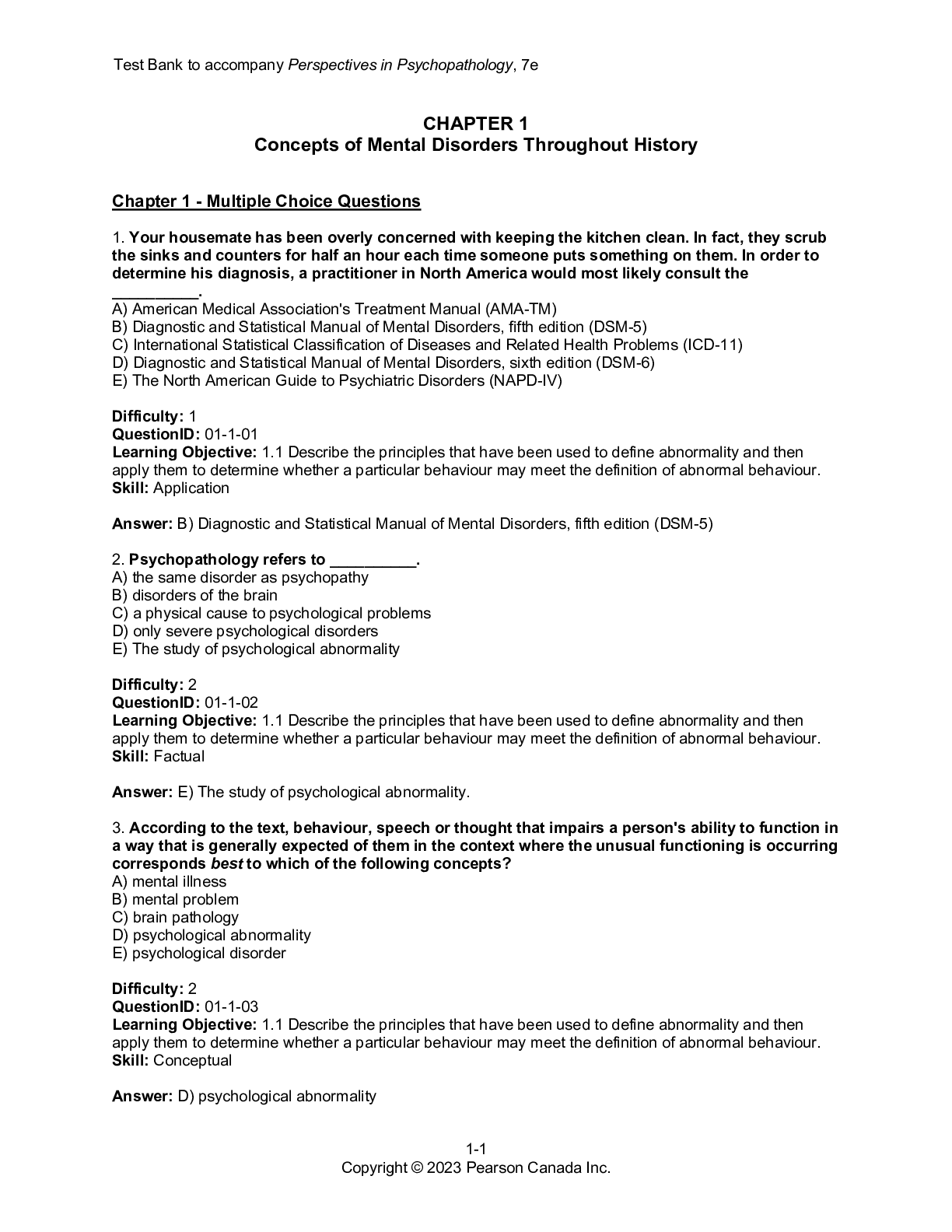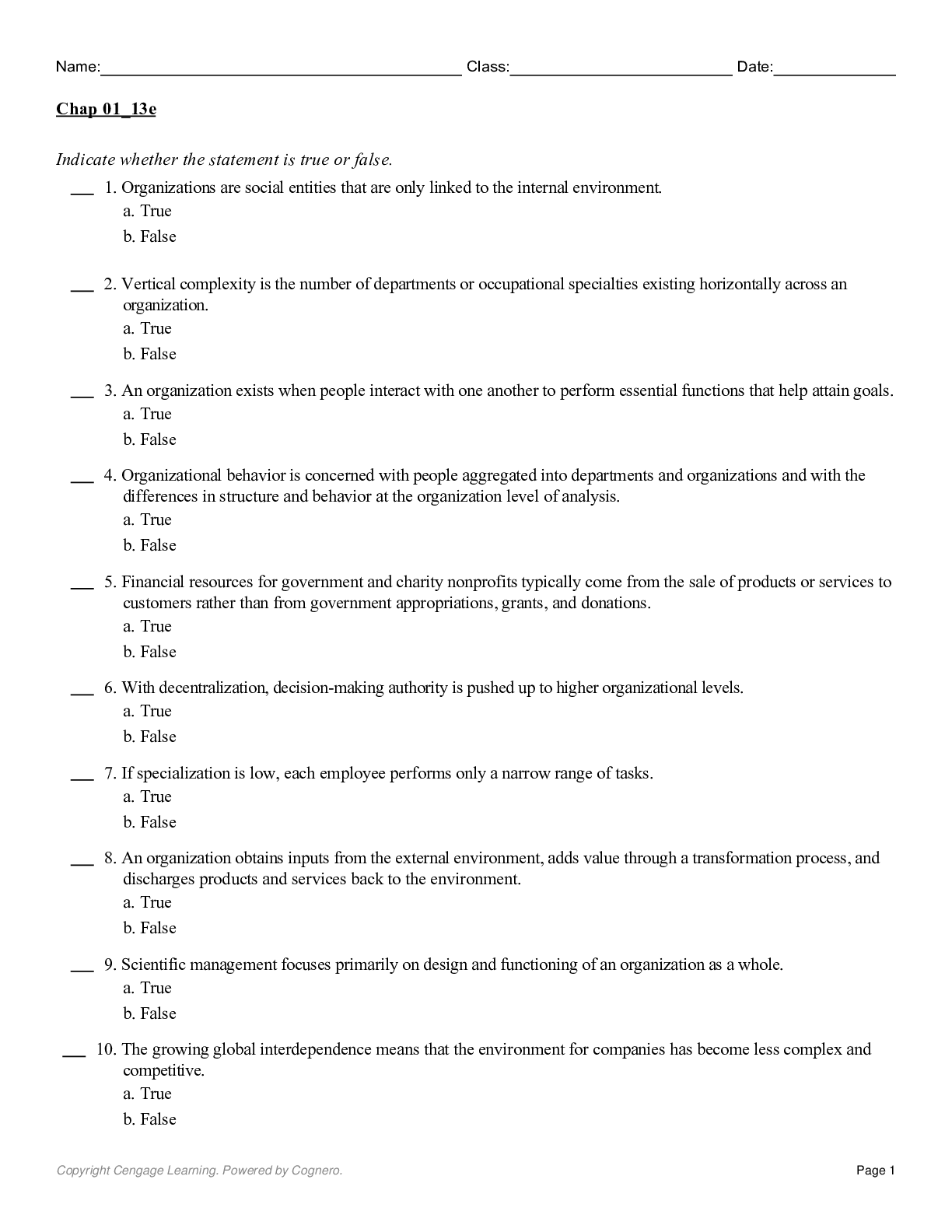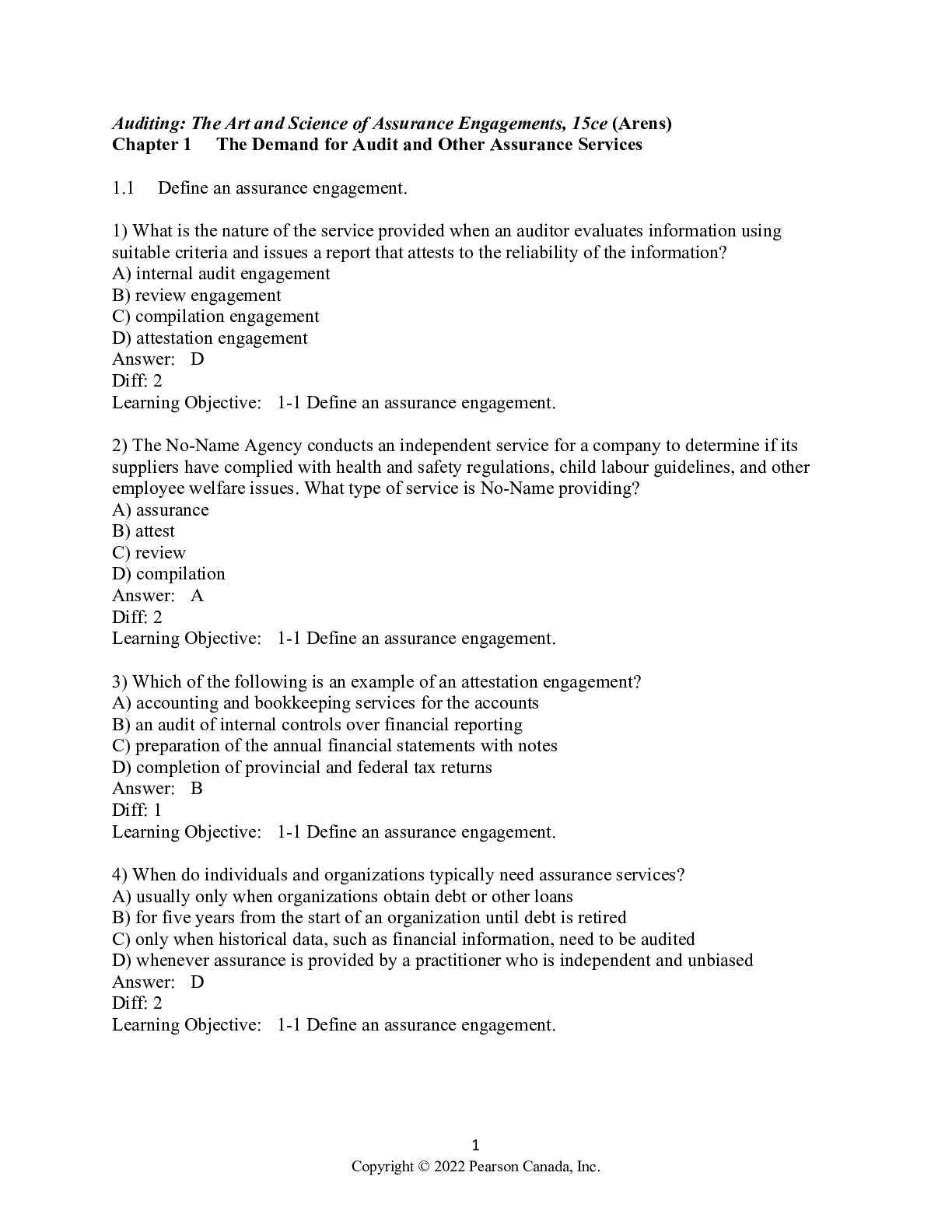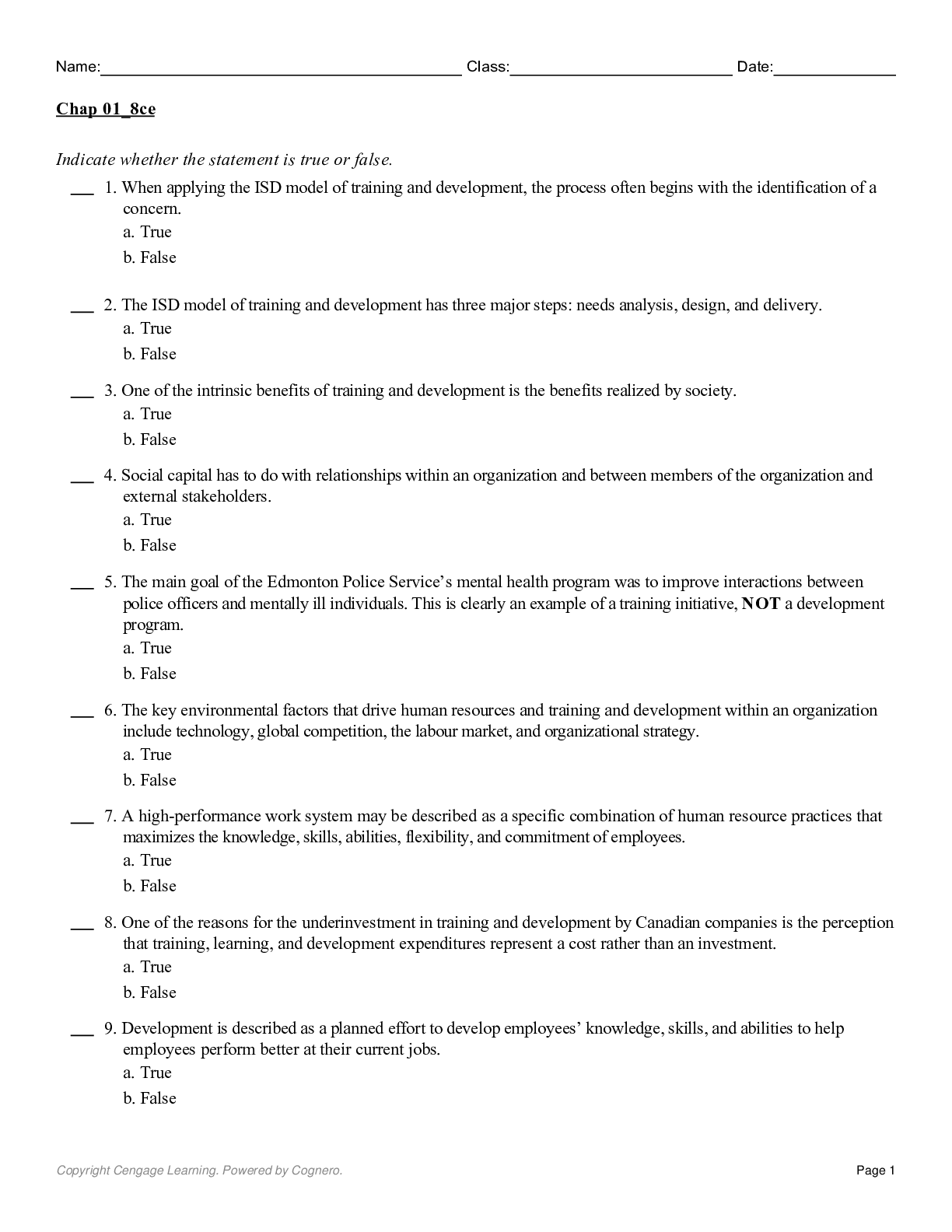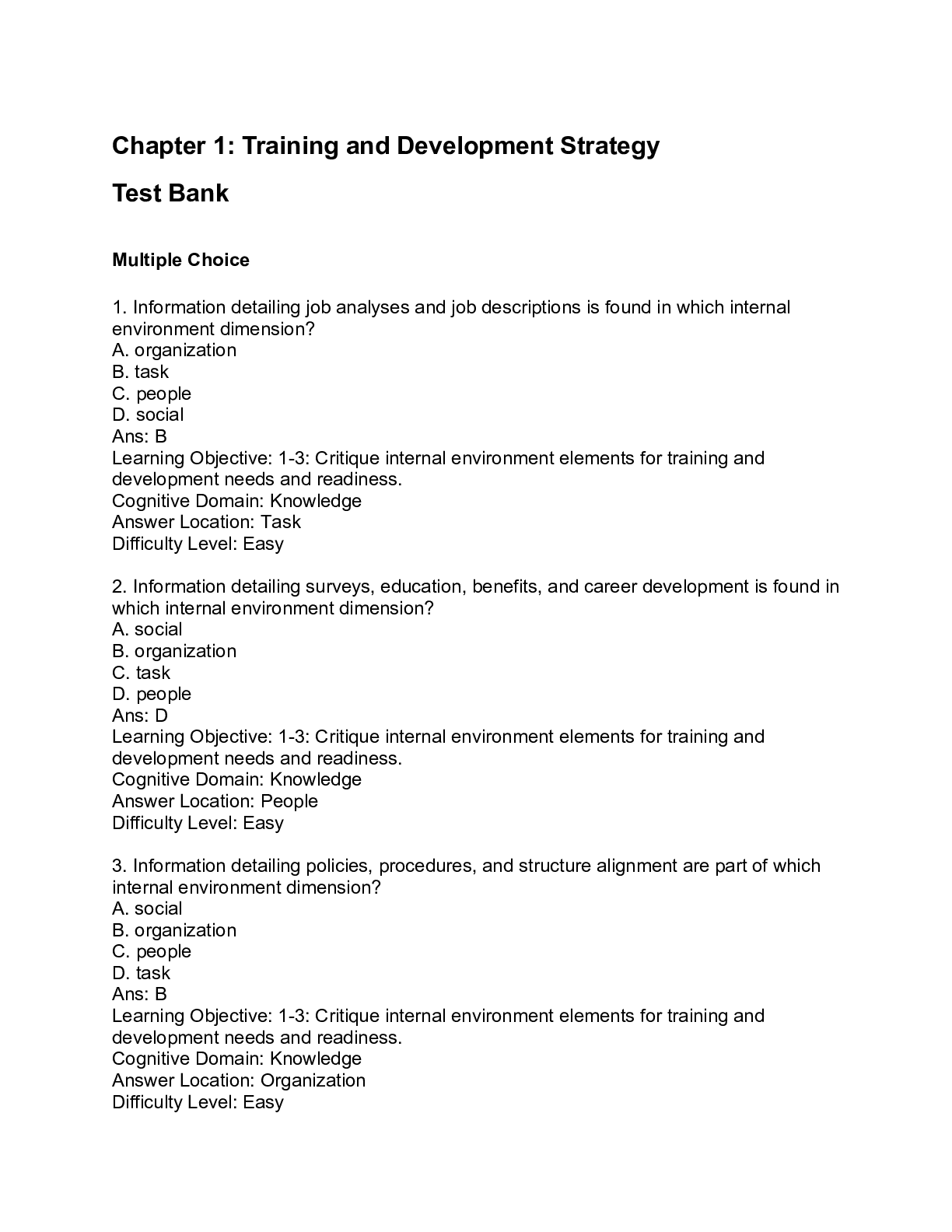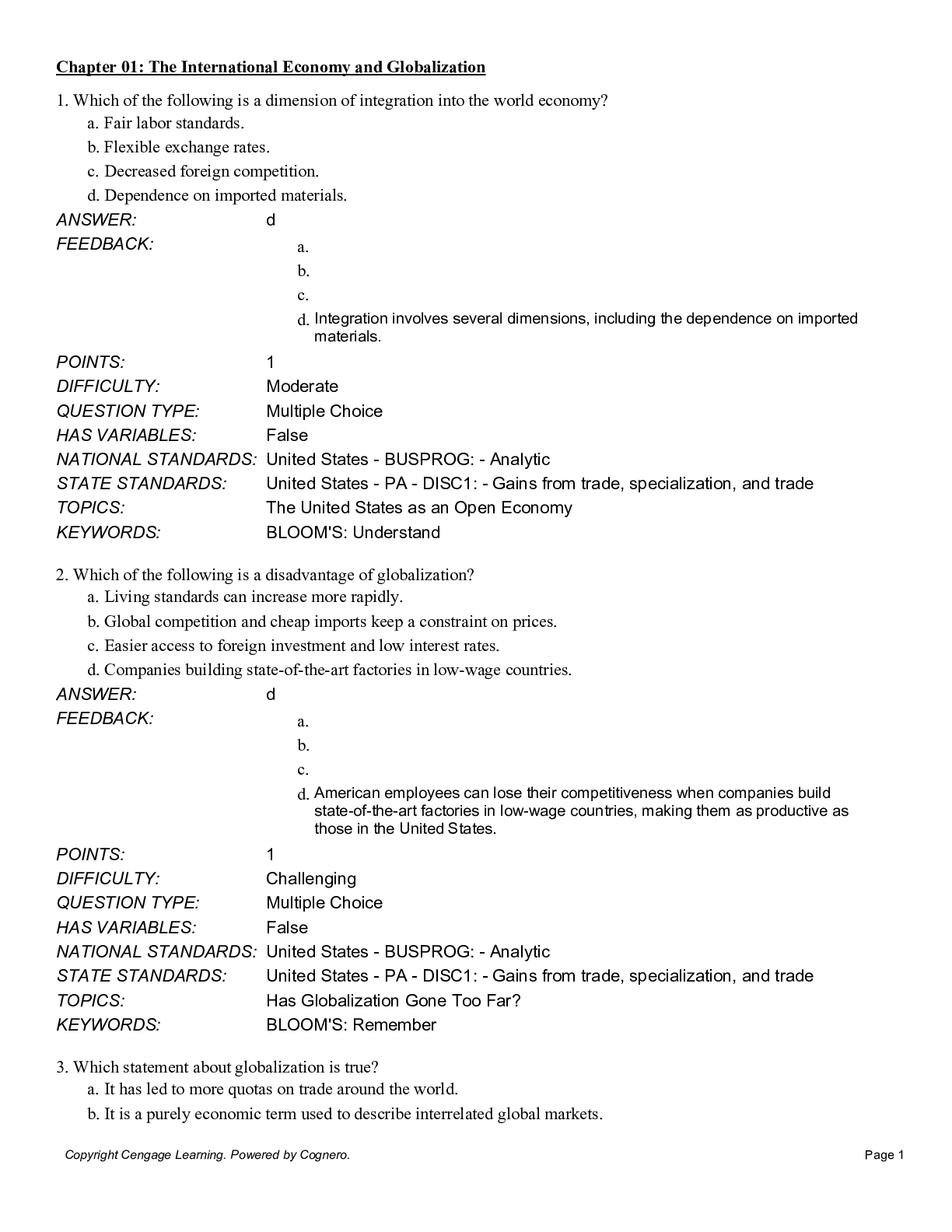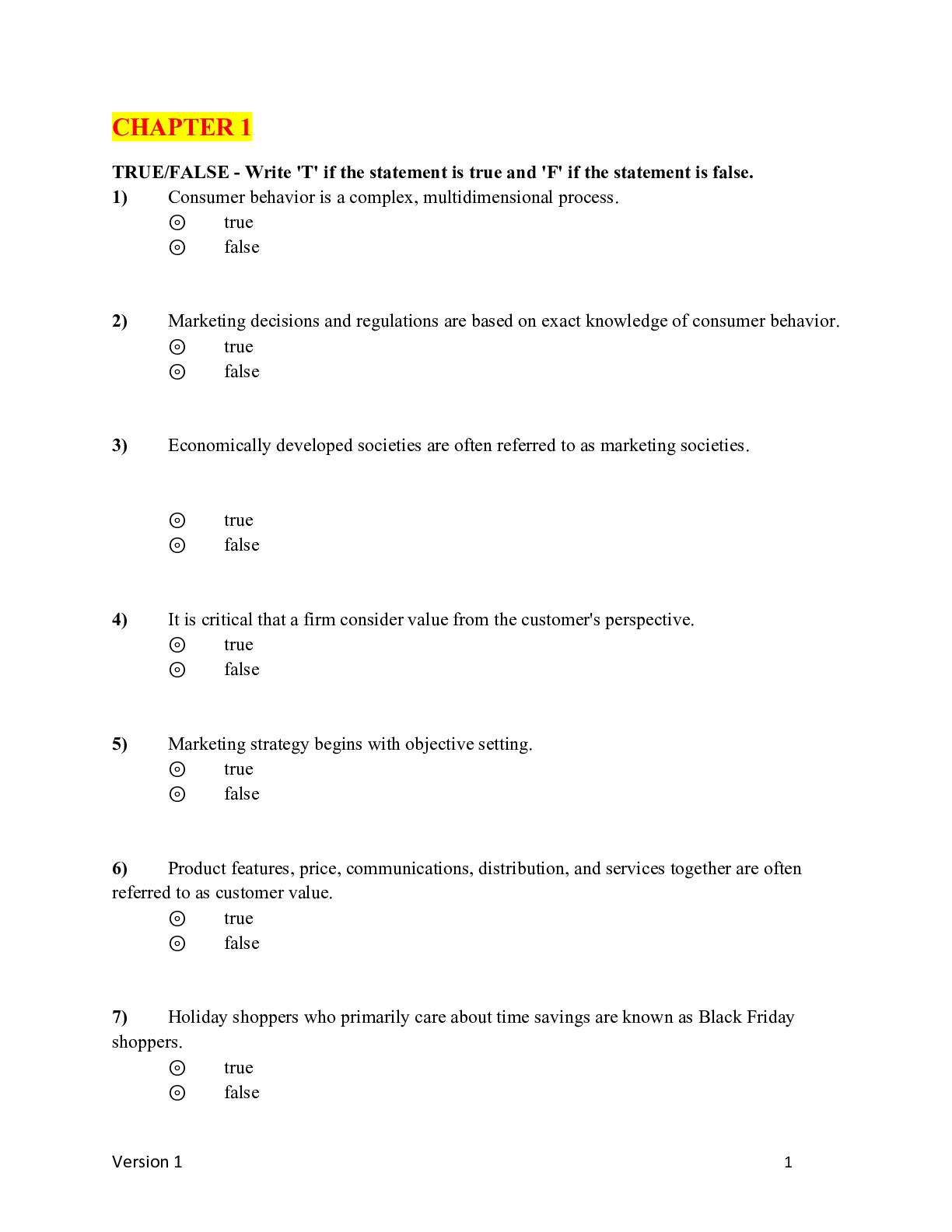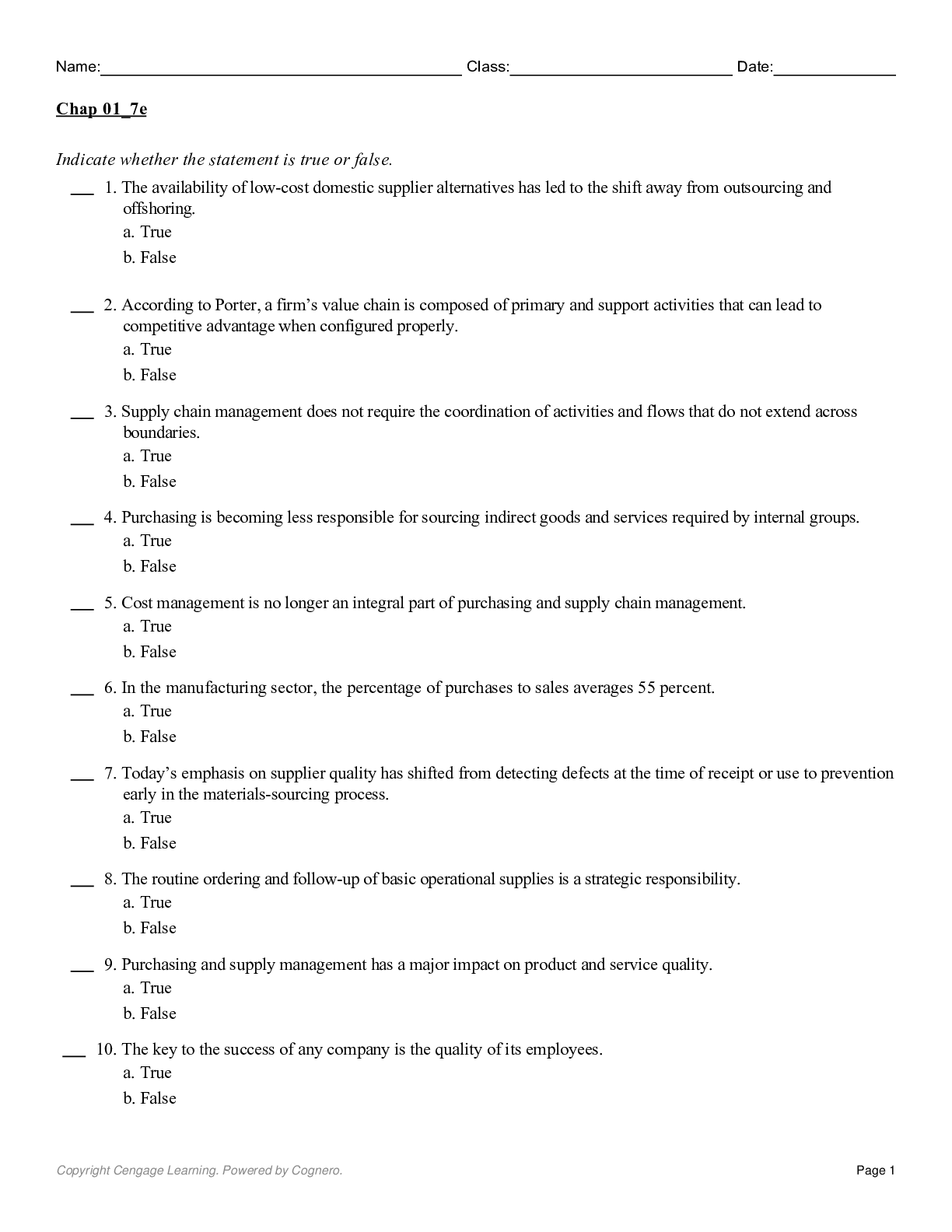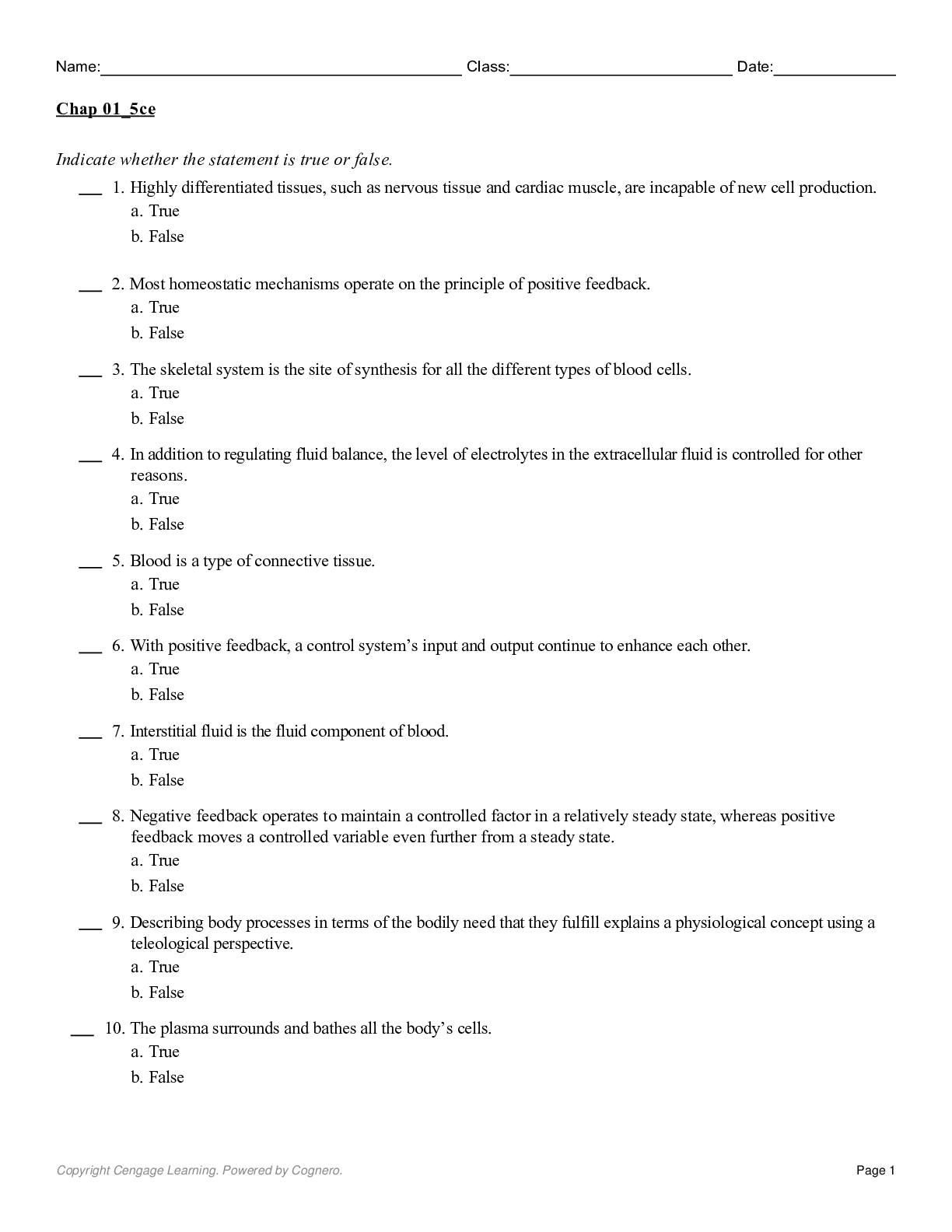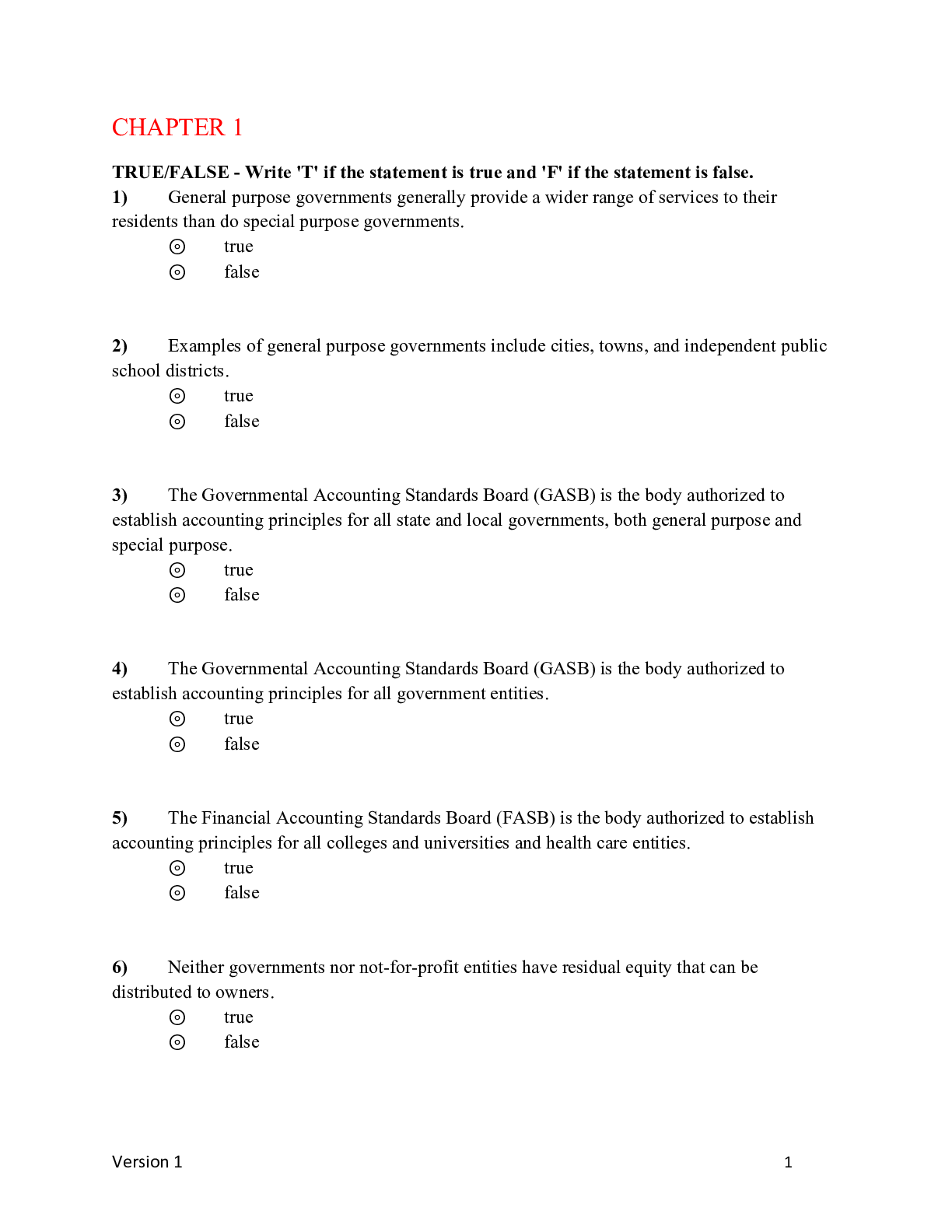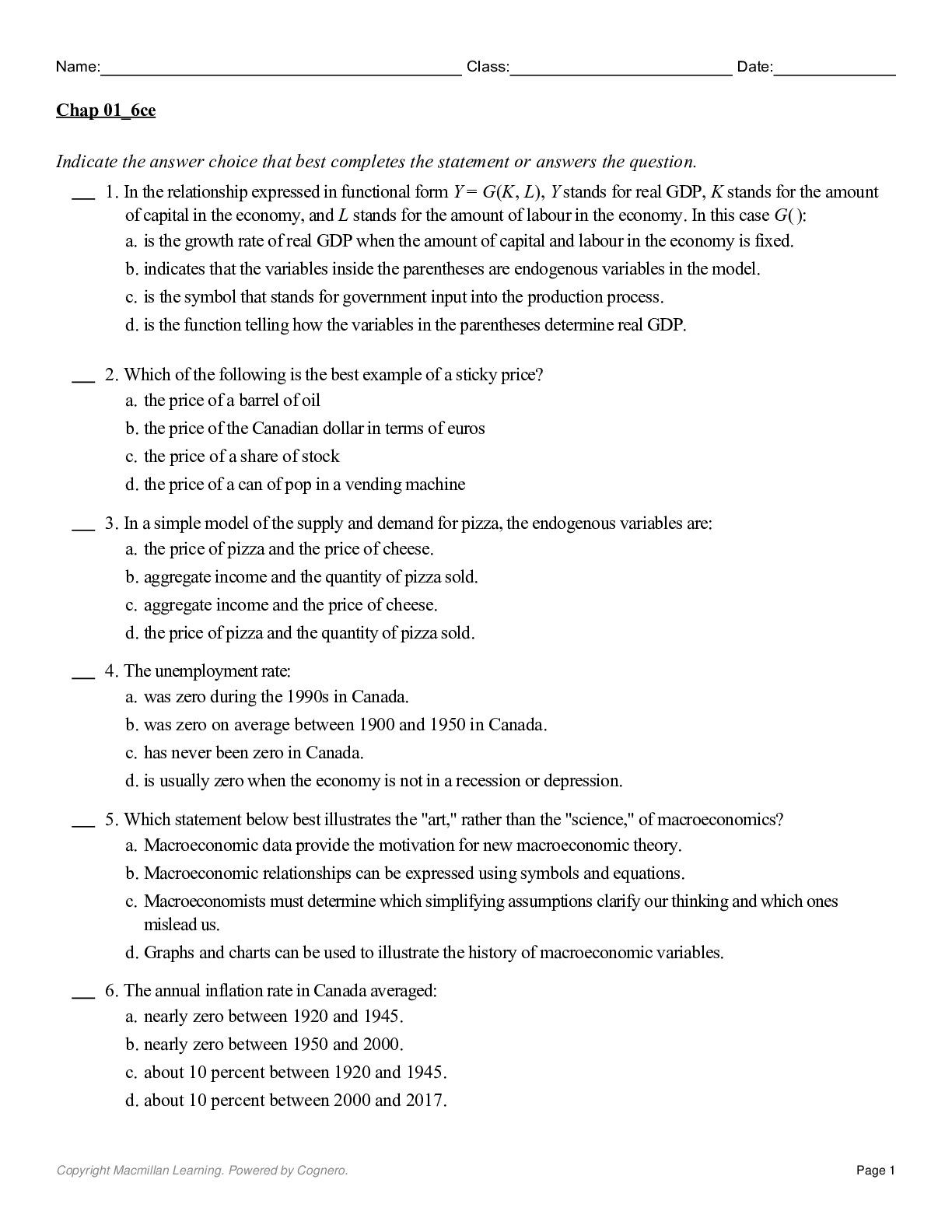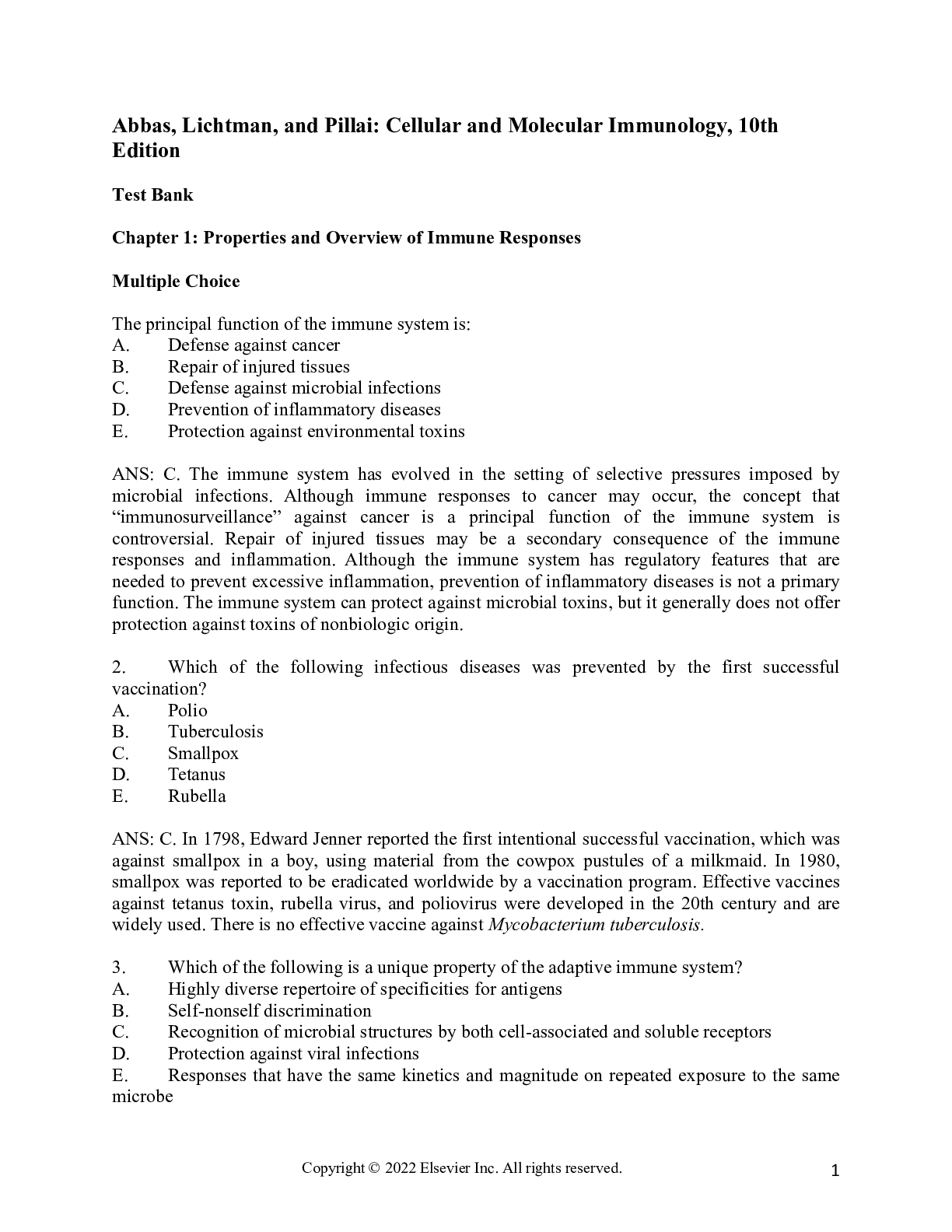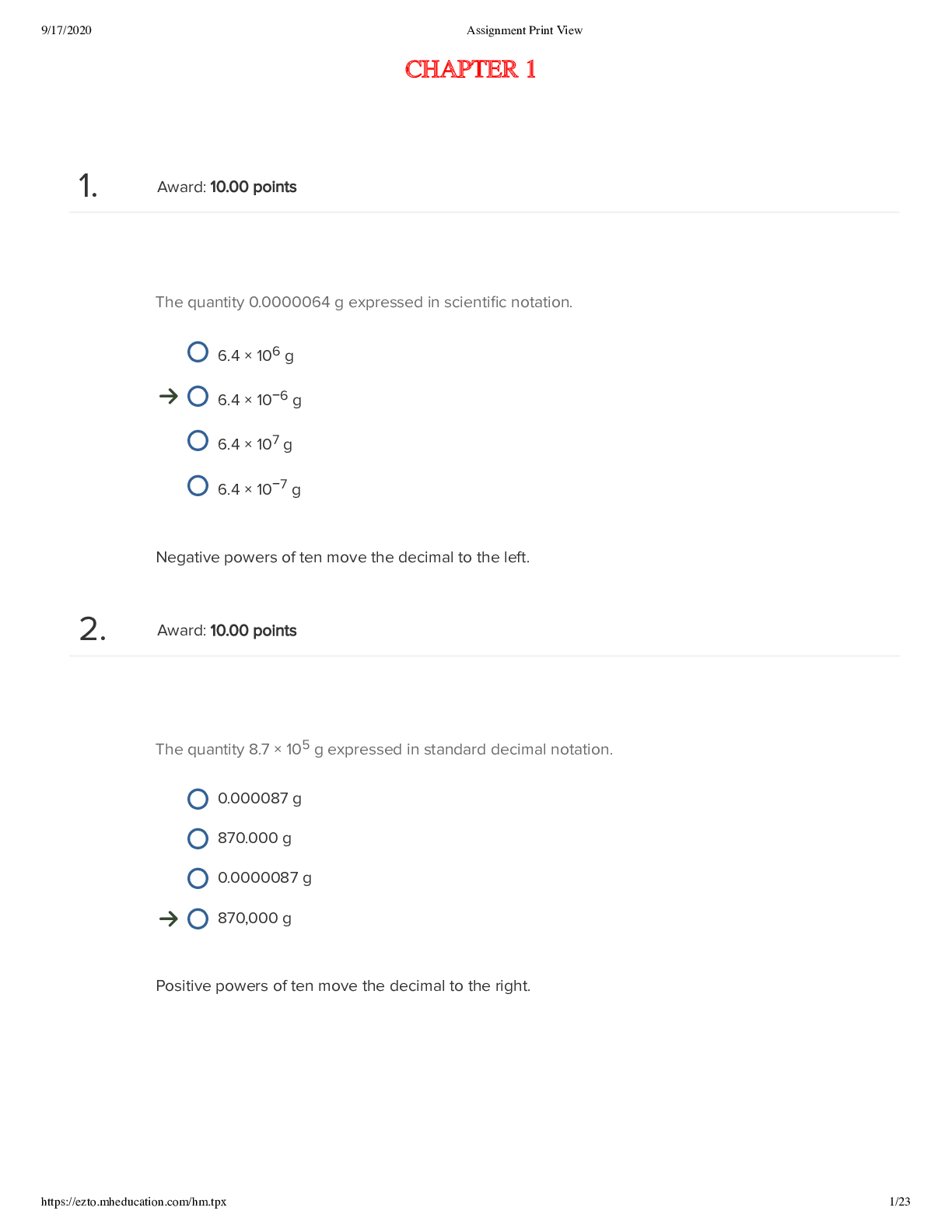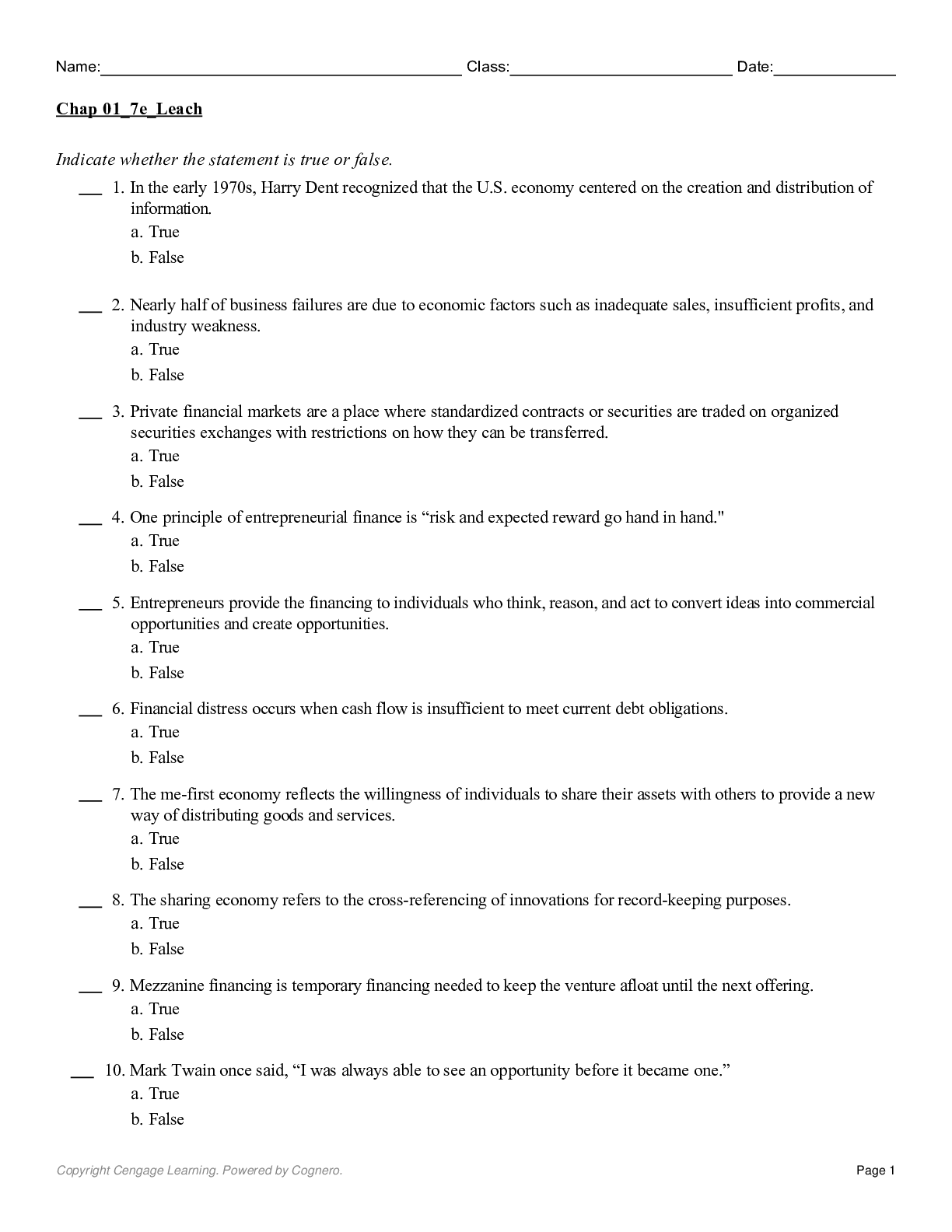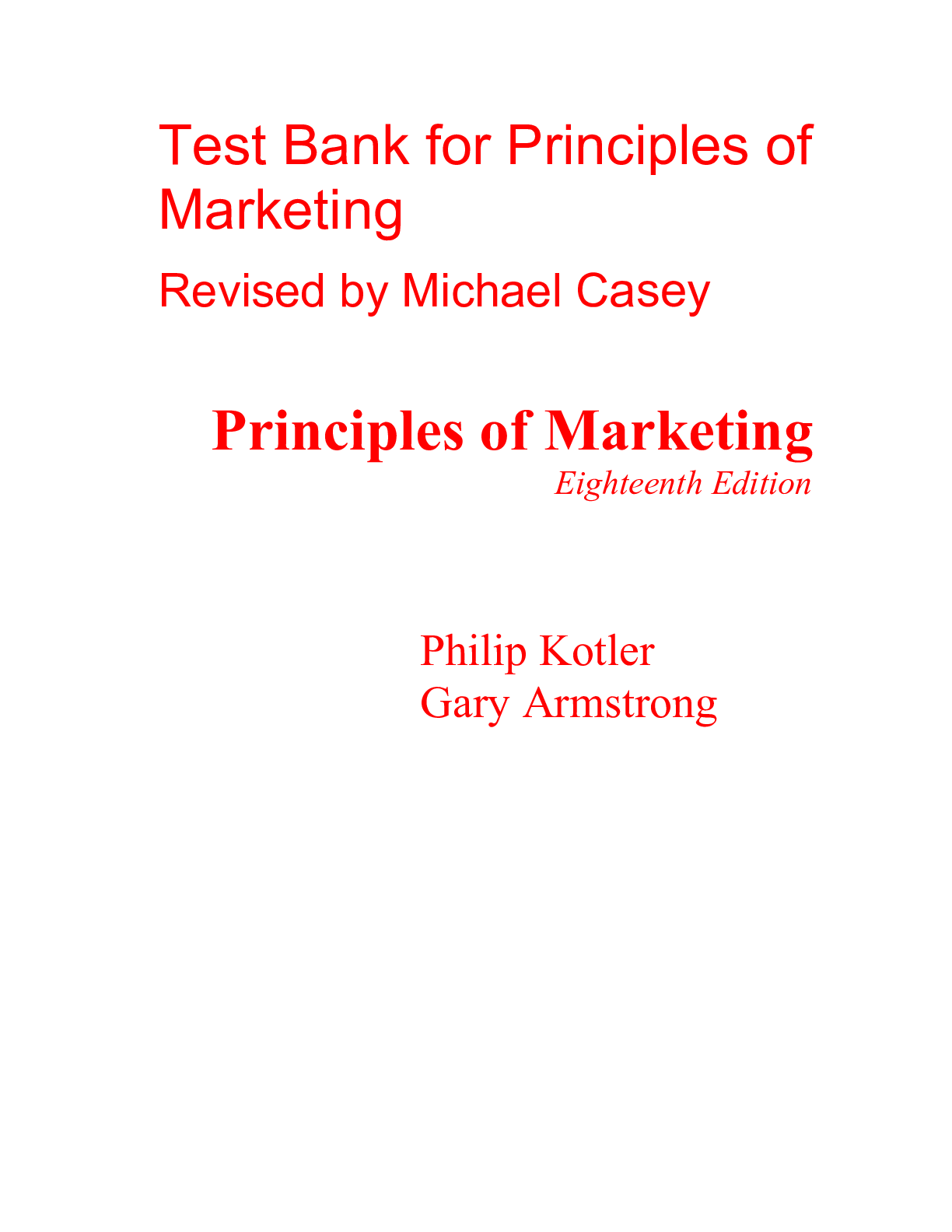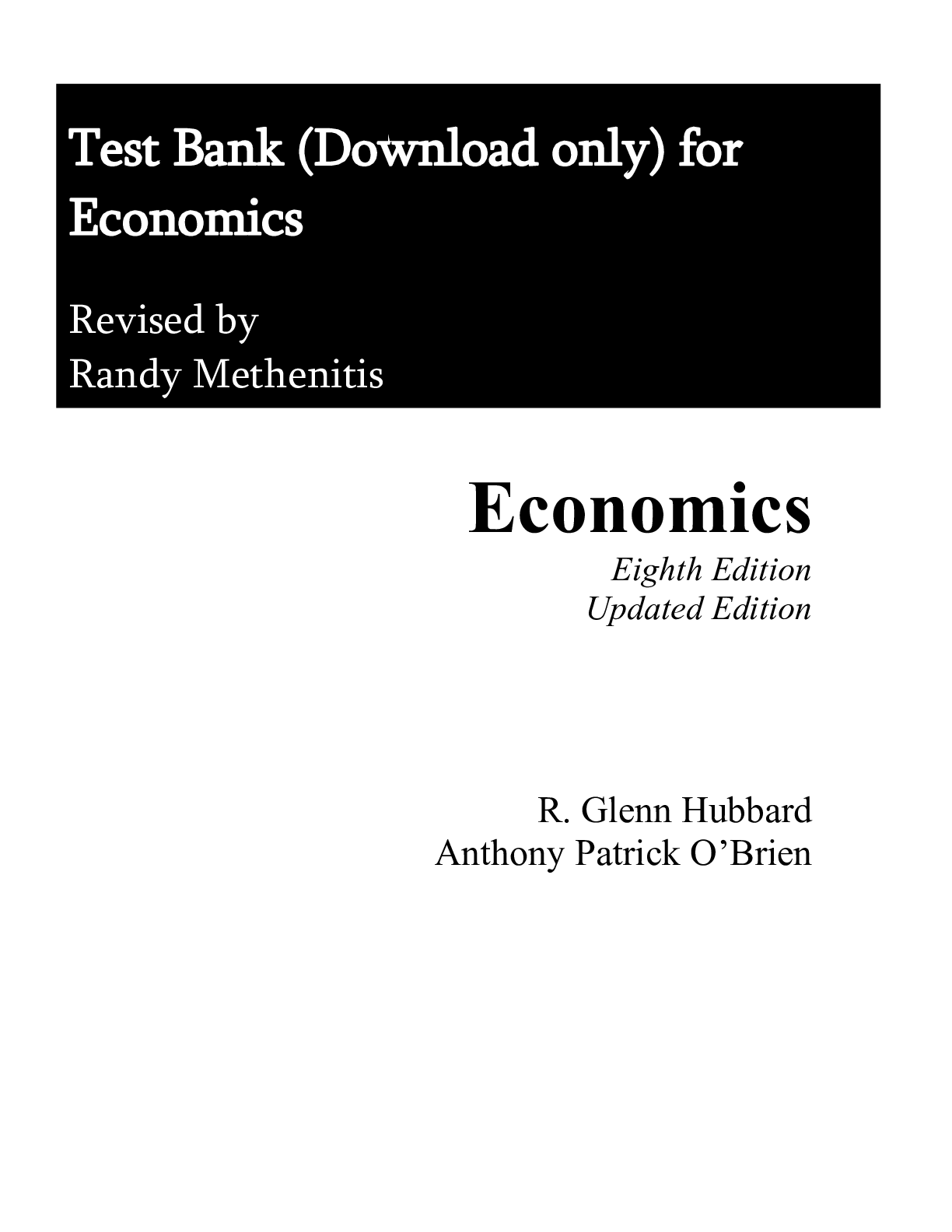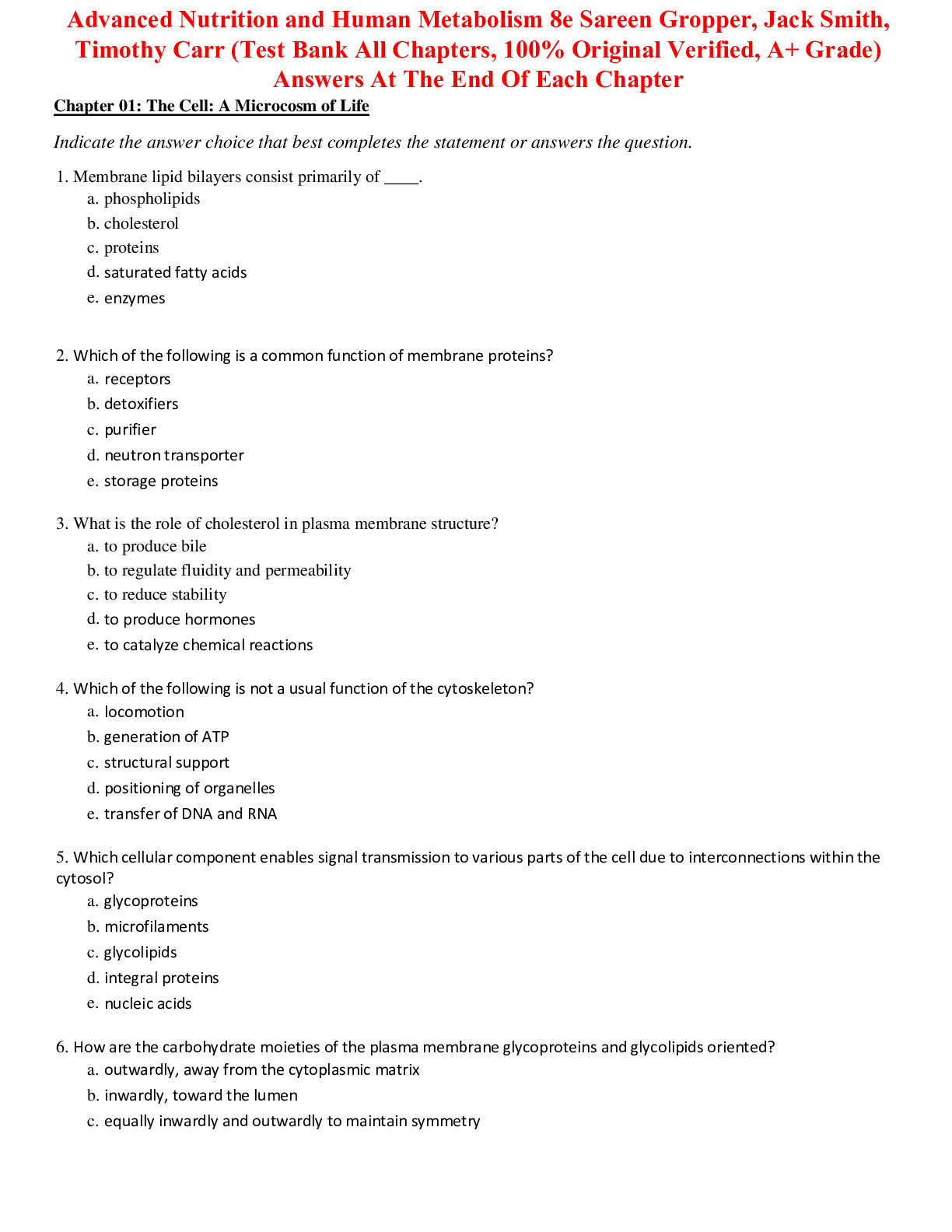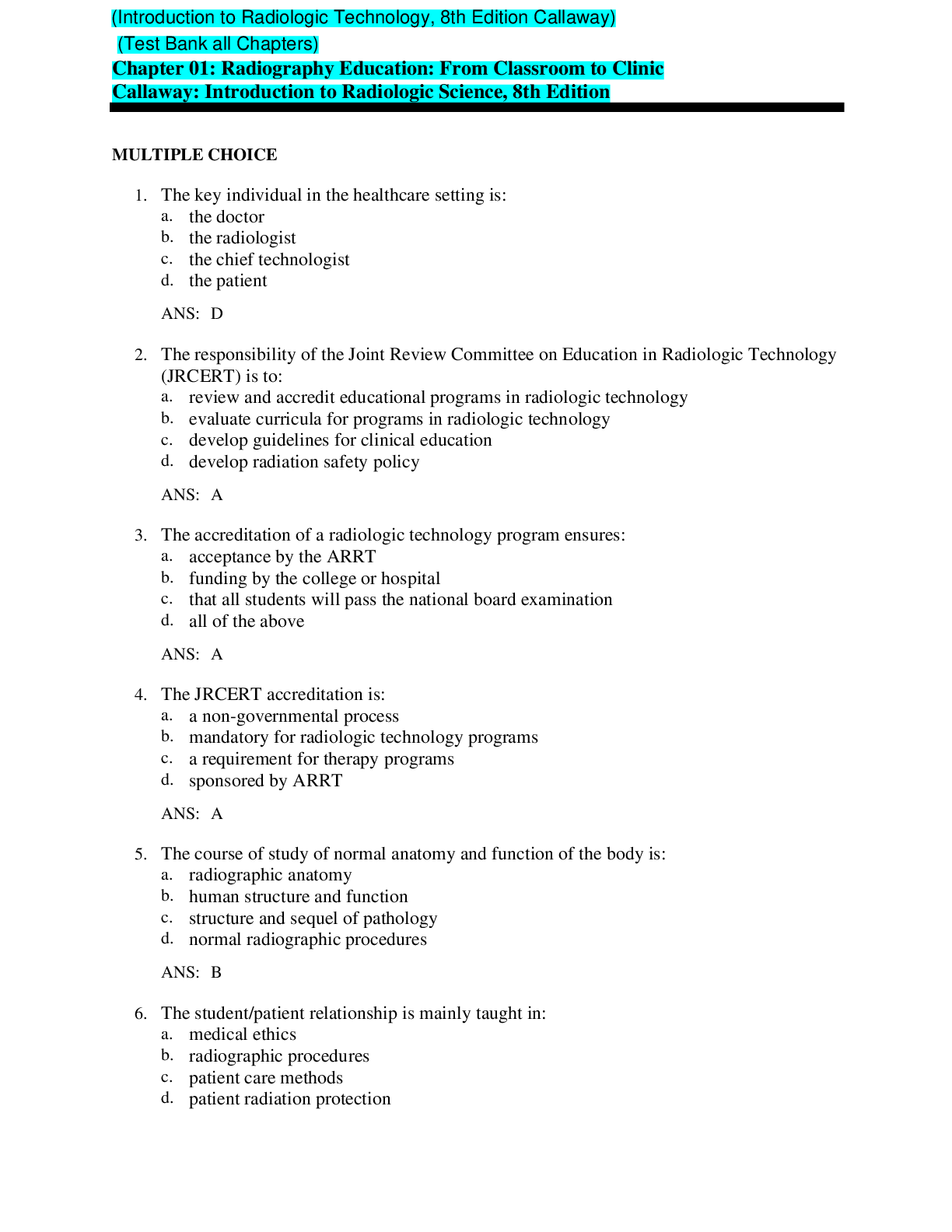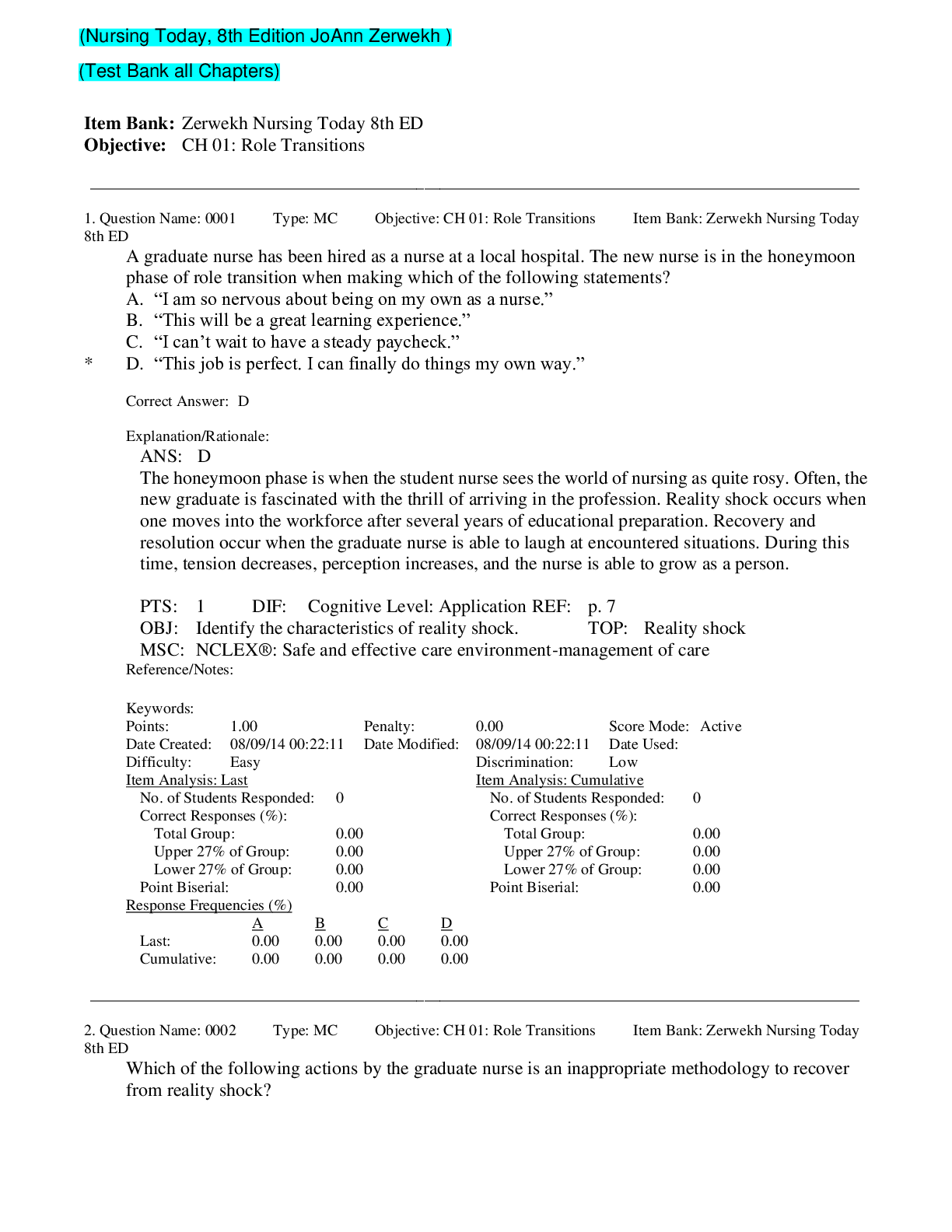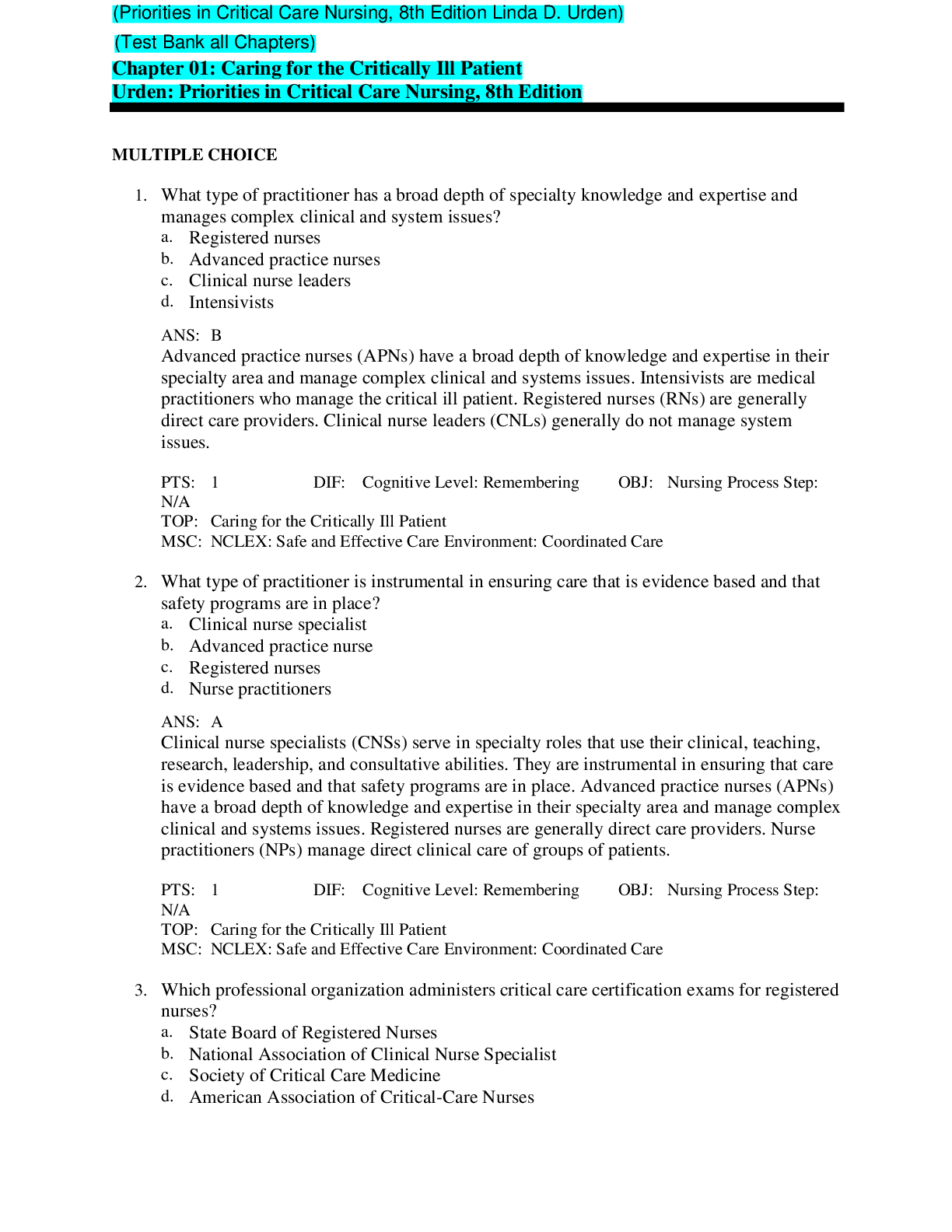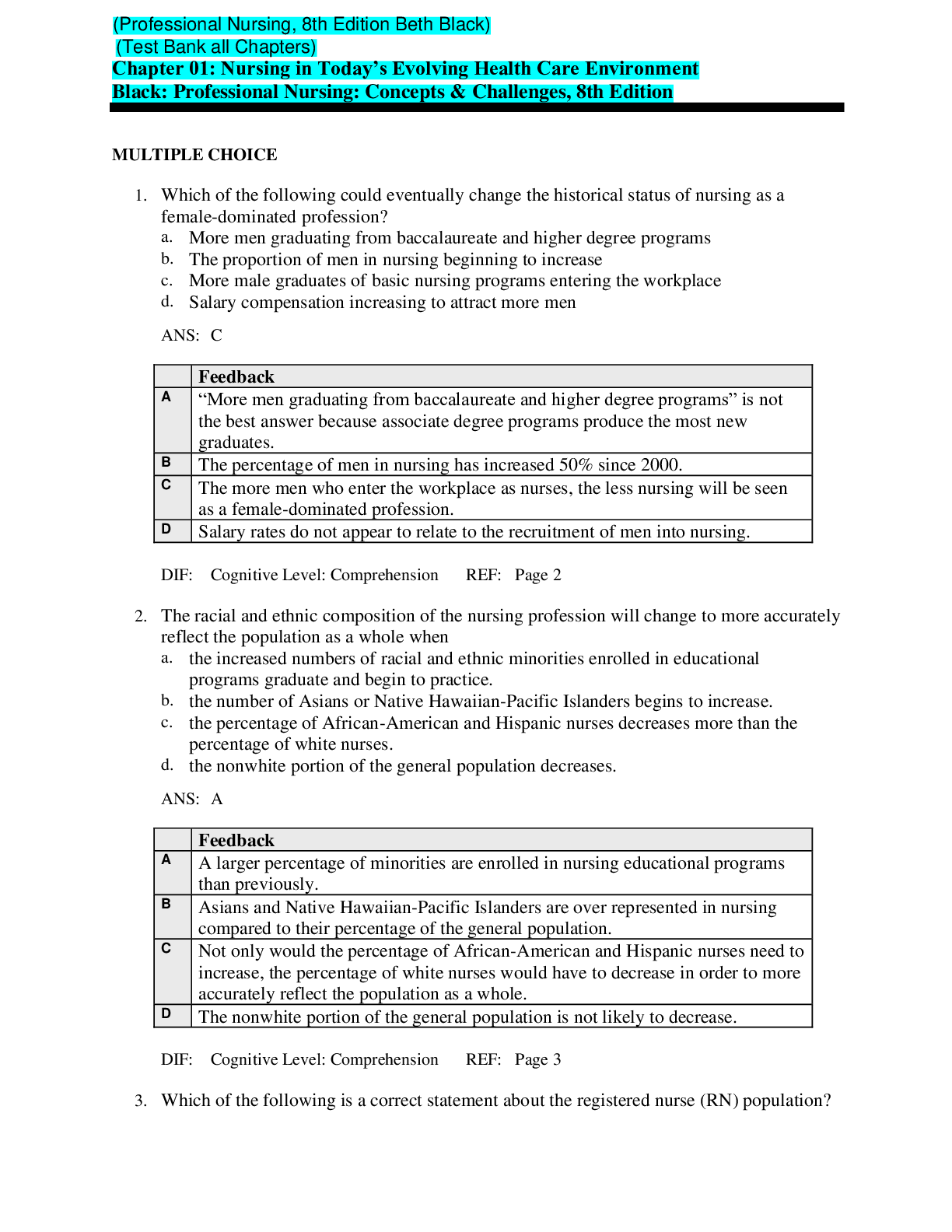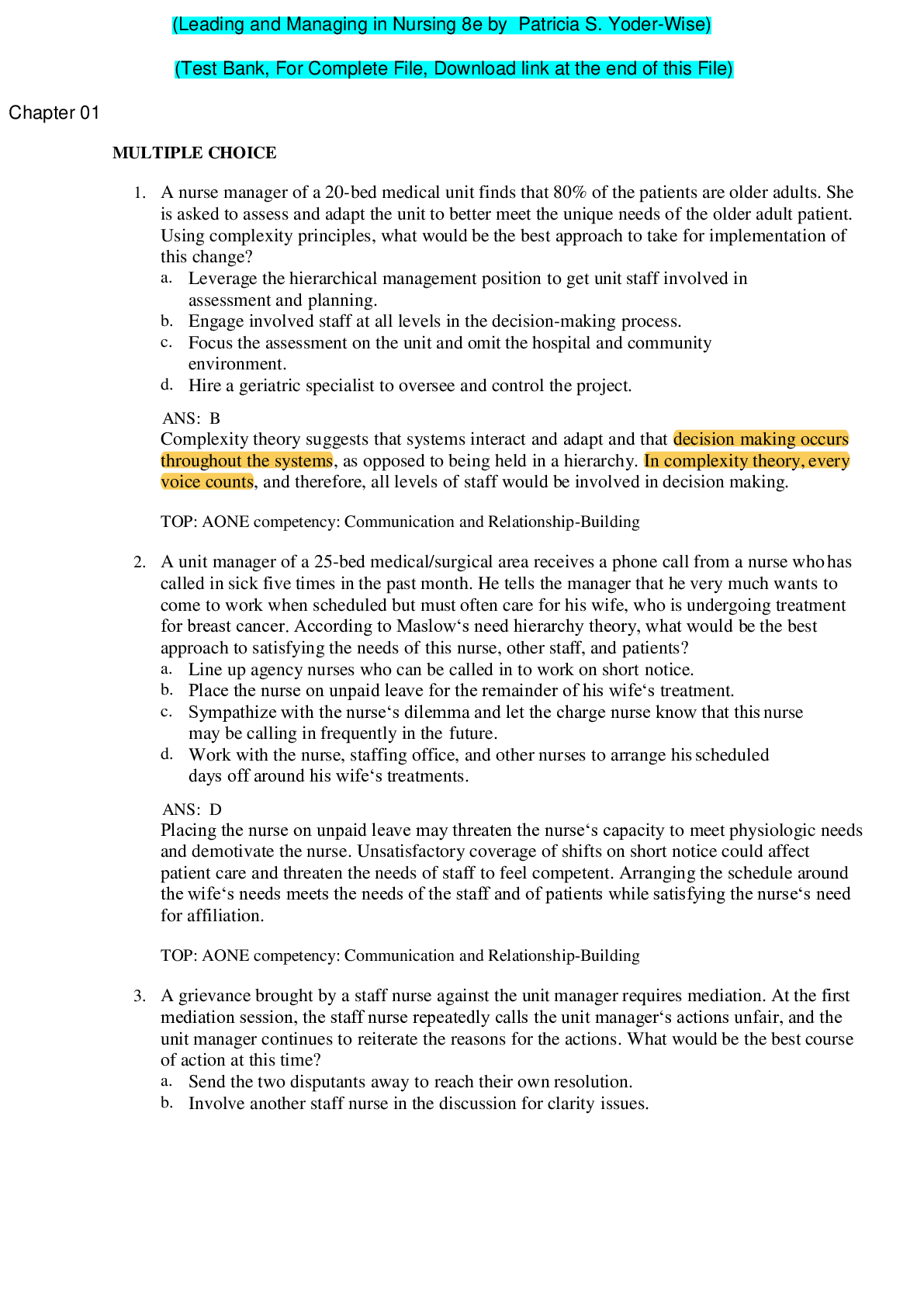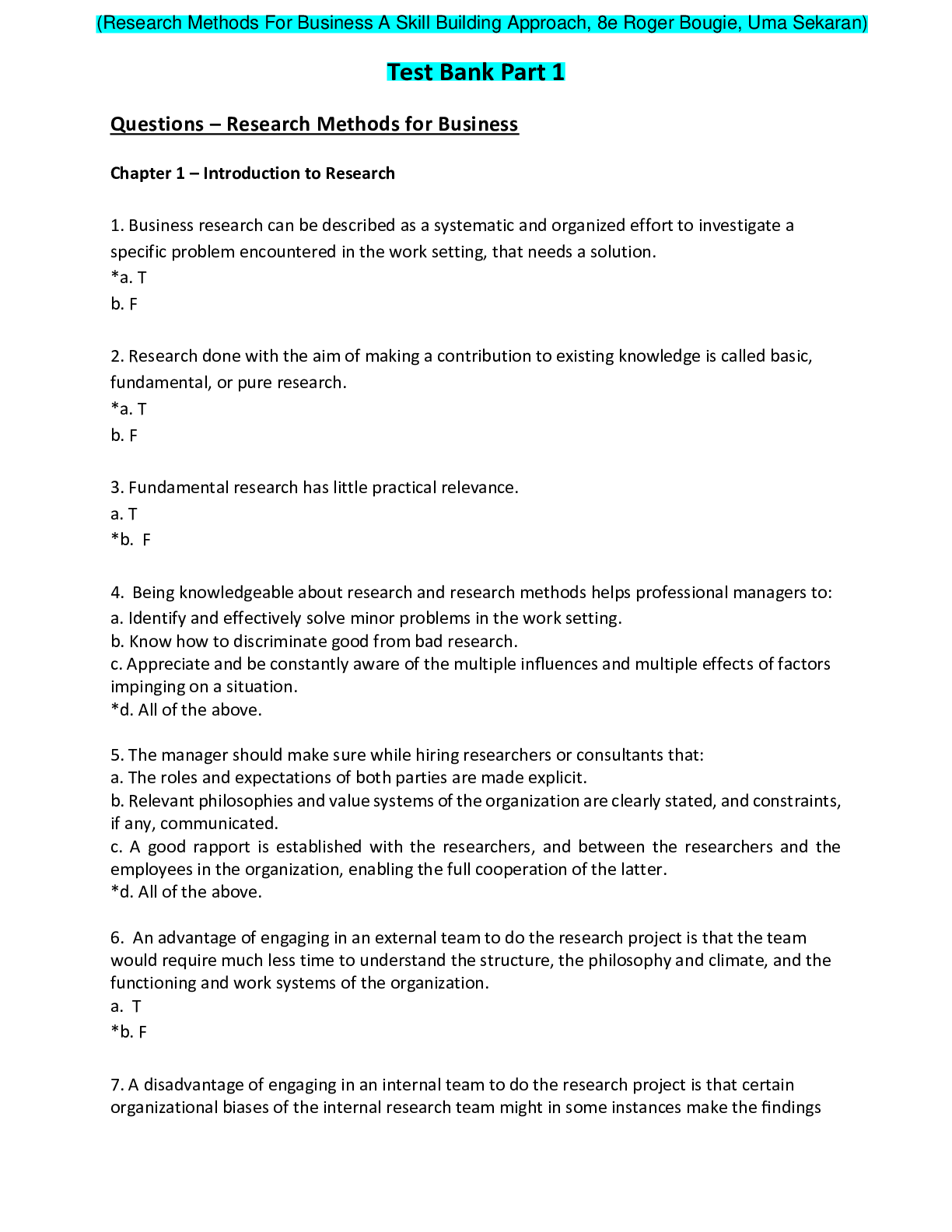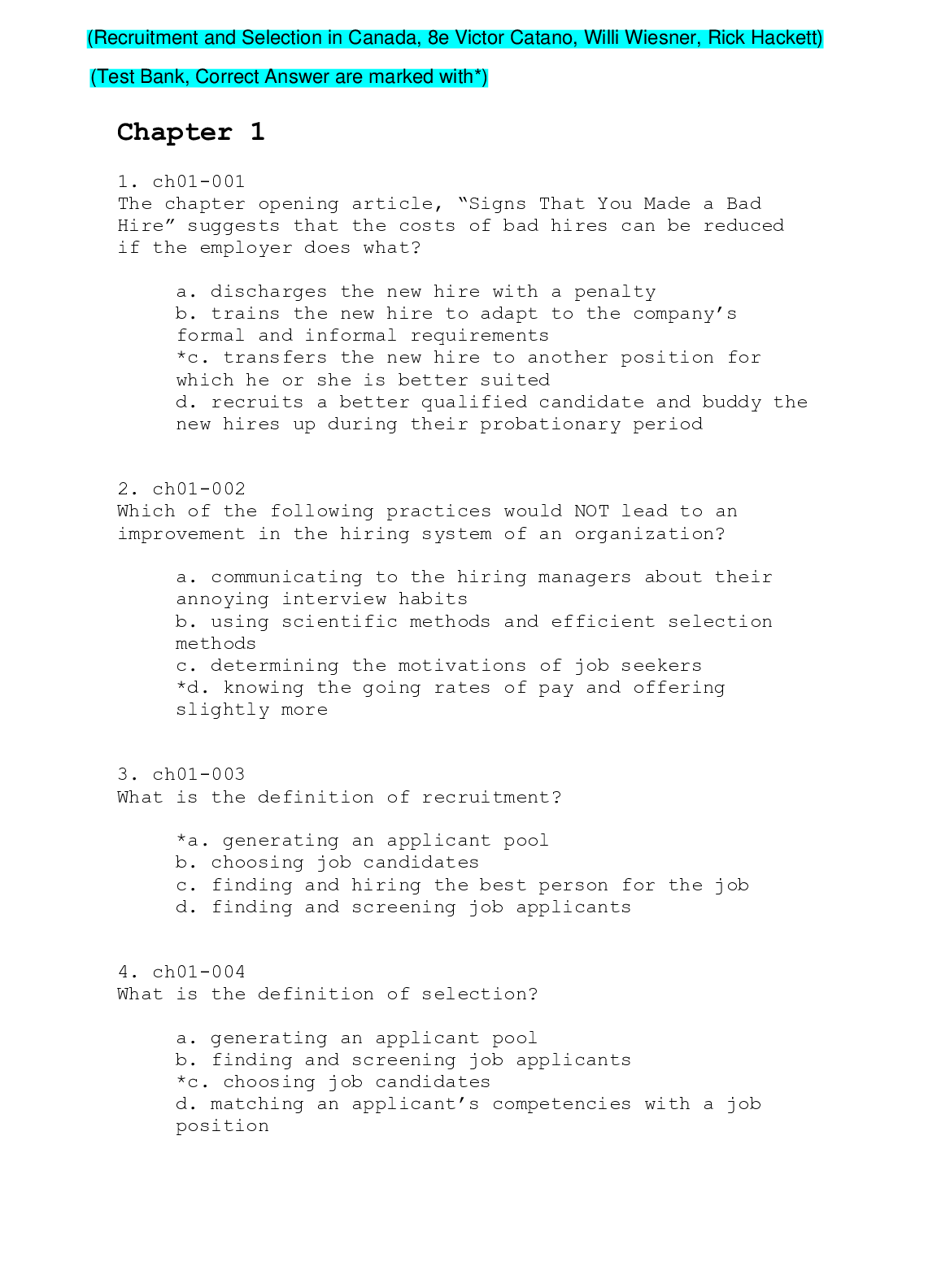Anthropology > TEST BANK > TEST BANK for Cultural Anthropology: A Problem-Based Approach 8th Edition by Richard H. Robbins, Rac (All)
TEST BANK for Cultural Anthropology: A Problem-Based Approach 8th Edition by Richard H. Robbins, Rachel A. Dowty Beech. All Chapters 1-9.
Document Content and Description Below
TEST BANK for Cultural Anthropology: A Problem-Based Approach 8th Edition by Richard H. Robbins, Rachel A. Dowty Beech. All Chapters 1-9. (Complete Download) ISBN-13: 9781544371634 Full chapters inc... luded 1 Culture and Meaning Problem 1: How Can People Begin to Understand Beliefs and Behaviors That Are Different From Their Own? Introduction: The World Behind Everyday Appearances Question 1.1: Why Do Human Beings Differ in Their Beliefs and Behaviors? Question 1.2: How Do People Judge the Beliefs and Behaviors of Others? The Ethnocentric Fallacy and the Relativist Fallacy Virginity Testing in Turkey and Cannibalism Among the Wari Objectivity and Morality Question 1.3: Is It Possible to See the World Through the Eyes of Others? The Embarrassed Anthropologist Confronting Witchcraft in Mexico The Endangered Anthropologist Question 1.4: How Can the Meanings That Others Find in Experience Be Interpreted and Described? Deciphering the Balinese Cockfight Question 1.5: What Can Learning About Other Peoples Tell Americans About Themselves? A Balinese Anthropologist Studies Football An Anthropologist Looks at a “Happy Meal” Case Study in Doing Anthropology #1: Why We Post Conclusions References and Suggested Readings 2 The Meaning of Progress and Development Problem 2: How Do We Explain the Transformation of Human Societies Over the Past 10,000 Years From Small-Scale Nomadic Bands of Hunters and Gatherers to Large-Scale Urban-Industrial States? Introduction: The Death of a Way of Life Question 2.1: Why Did Hunter-Gatherer Societies Switch to Sedentary Agriculture? Life Among Hunter-Gatherers: The Hadza and the Bushman The Transition to Agriculture Producing Potato Calories Question 2.2: Why Are Some Societies More Industrially Advanced Than Others? The British in India Cotton, Slavery, and the Cherokee Removal Question 2.3: Why Do Poor Countries Not Modernize and Develop in the Same Way as Wealthier Countries? Debt, SAPs, and Vultures Question 2.4: How Do Modern Standards of Health and Medical Treatment Compare With Those of Traditional Societies? Illness and Inequality The Meaning of Illness Question 2.5: Why Are Simpler Societies Disappearing? Cultural Devastation and Radical Hope Case Study in Doing Anthropology #2: Searching for the Perfect Diet and Doing Development What We Eat Women in Development Conclusions References and Suggested Readings 3 Debt, Globalization, and the Nation-State Problem 3: How Does Our Economy Affect Our Way of Life? Introduction: Debt Question 3.1: How Is Money Created and Why Must Modern Economies Perpetually Grow? Money, Wealth, and Well-Being A Brief History of Money The Society of Perpetual Growth Question 3.2: Where Does the Wealth Needed to Sustain Growth Come From? Capital Conversion Question 3.3: What Kind of Economic System Is Necessary to Sustain Growth? “The Great Transformation” The Emergence of Neoliberalism Market Externalization Question 3.4: What Is the Role of the Nation-State in Sustaining Growth? T-Shirt Travels Free Trade Avoiding Democratic Decision Making The Use of Force Question 3.5: Why Do Economies Collapse? Tulip Bulbs and Bubbles Case Study in Doing Anthropology #3: Anthropology and Public Policy The Market Externalities of “Hog Hotels” Conclusions References and Suggested Readings 4 The Cultural Construction of Social Hierarchy Problem 4: Why Are Modern Societies Characterized by Growing Economic Inequalities? Introduction: Plutocracy Question 4.1: How Unequal Are We? Income and Wealth Inequality Stratification and Youth Question 4.2: Why Is Social and Economic Inequality Increasing? Question 4.3: How Do People Come to Accept Social Hierarchies as Natural? Constructing the Ideology of Racism The Social Construction of “Intelligence” Constructing Stratification by Gender Question 4.4: How Do People Living in Poverty Adapt to Their Condition? Kinship as an Adaptation to Poverty In Search of Respect: Selling Crack in El Barrio Question 4.5: What Are the Effects of Inequality on Society? The Health Effects of Inequality Case Study in Doing Anthropology #4: Health and Human Rights Anthropology and Human Rights Anthropology and Medical Rights: The Work of Paul Farmer Health as a Human Right Conclusions References and Suggested Readings 5 The Social and Cultural Construction of Reality Problem 5: Why Do People Believe Different Things, and Why Are They So Certain Their View of the World Is Correct and Other Views Are Wrong? Introduction: The Central Question Question 5.1: How Does Language Affect the Meanings People Assign to Experience? Borrowing Meaning With Metaphors Kwakwaka’wakw Metaphors of Hunger The Metaphors of Contemporary Witchcraft and Magic Question 5.2: How Does Symbolic Action Reinforce a Particular View of the World? The Kwakwaka’wakw Cannibal Dance The Ritual of Contemporary Witchcraft and Magic Dorothy Gale Meets Luke Skywalker Question 5.3: How Do People Come to Believe What They Do, and How Do They Continue to Hold to Their Beliefs Even If They Seem Contradictory or Ambiguous? The Process of Interpretive Drift Explaining Why the Sun Moves Around Earth Question 5.4: How Can We Account for the Different Meanings People Assign to Experiences? What Kinds of Worldviews Are Associated With Each Cultural Type? Question 5.5: How Can People Reorder Their View of the World If It Becomes Unsatisfactory? Wovoka and the Ghost Dance Mother Ann Lee and the Shakers Case Study in Doing Anthropology #5: Political Consulting and the Power of Metaphor Moral Politics: The Nation as a Family Policy Views: Same-Sex Marriage Translating Theory Into Action Conclusions References and Suggested Readings 6 Patterns of Family Relations Problem 6: What Do We Need to Know Before We Can Understand the Dynamics of Family Life in Other Societies? Introduction: Soap Operas and Family Relations Question 6.1: What Is the Composition of the Typical Family Group? The Family Composition of the Bushman The Family Composition of the Trobriand Islanders The Family Composition of the Chinese Question 6.2: How Are Families Formed and Ideal Family Types Maintained? The Family Cycle of the Bushman The Family Cycle of the Trobriand Islanders The Family Cycle of the Chinese Question 6.3: What Are the Roles of Sexuality, Love, and Wealth? Sex, Love, and Wealth Among the Bushman Sex, Love, and Wealth Among the Trobriand Islanders Sex, Love, and Wealth Among the Chinese Question 6.4: What Threatens to Disrupt the Family Unit? Threats to the Bushman Family Threats to the Trobriand Island Family Threats to the Chinese Family Case Study in Doing Anthropology #6: Combating HIV/AIDS AIDS Prevention in Mexico Sexual Silence Power Relations Trust and Fidelity Sex and Love Why Is the Message of Traditional AIDS Prevention Programs Sometimes Ignored? Designing AIDS Prevention Programs Conclusions References and Suggested Readings 7 The Cultural Construction of Identity Problem 7: How Do People Determine Who They Are, and How Do They Communicate Who They Think They Are to Others? Introduction: The Importance of Self Question 7.1: How Does the Concept of Personhood Vary From Society to Society? The Egocentric and Sociocentric Self Personhood in Japan and America Question 7.2: How Do Societies Distinguish Individuals From One Another? Constructing Male and Female Language, Gender, and Race Question 7.3: How Do Individuals Learn Who They Are? The Transition to Adulthood Work and Career Question 7.4: How Do Individuals Communicate Their Identities to One Another? Gifts and Commodities Gift Giving and Christmas in America Question 7.5: How Do Individuals Defend Their Identities When They Are Threatened? Making Moka in Papua New Guinea Migrants and Refugees Case Study in Doing Anthropology #7: Fat Talk Body Image and Identity Fat Talk The Problem Addressing the Problem Conclusions References and Suggested Readings 8 The Cultural Construction of Violent Conflict Problem 8: How Do Societies Give Meaning to and Justify Collective Violence? Introduction: The Justification of Violent Conflict Question 8.1: How Do Societies Create a Bias in Favor of Collective Violence? Horses, Rank, and Warfare Among the Kiowa Good Hosts Among the Yanomamö Defending Honor in Kohistan Constructing Religious Justifications for Violence Question 8.2: How Do Societies Create a Bias Against Violent Conflict? Characteristics of Peaceful Societies Question 8.3: What Are the Economic, Political, or Social Differences Between Peaceful and Violent Societies? The Need to Protect Resources and Honor Creating the Conditions for Violence Sexism and Violent Conflict Question 8.4: What Are the Effects of War on Societies? The Impact of War on Population The Evolution of the Nation-State Violence and Male Solidarity Question 8.5: How Is It Possible to Justify the Creation of Weapons of Mass Destruction? The Anthropology of a Nuclear Weapons Laboratory The Language of Nuclear Destruction Case Study in Doing Anthropology #8: The Uses (and Misuses?) of Anthropology for Peace and War Anthropology and the Outcomes of War Anthropology and Peace Studies The Human Terrain Concept and Anthropologists in the Military The Anthropological Reaction to Human Terrain Systems The End of Human Terrain Systems Conclusions References and Suggested Readings Glossary References Index [Show More]
Last updated: 10 months ago
Preview 1 out of 90 pages
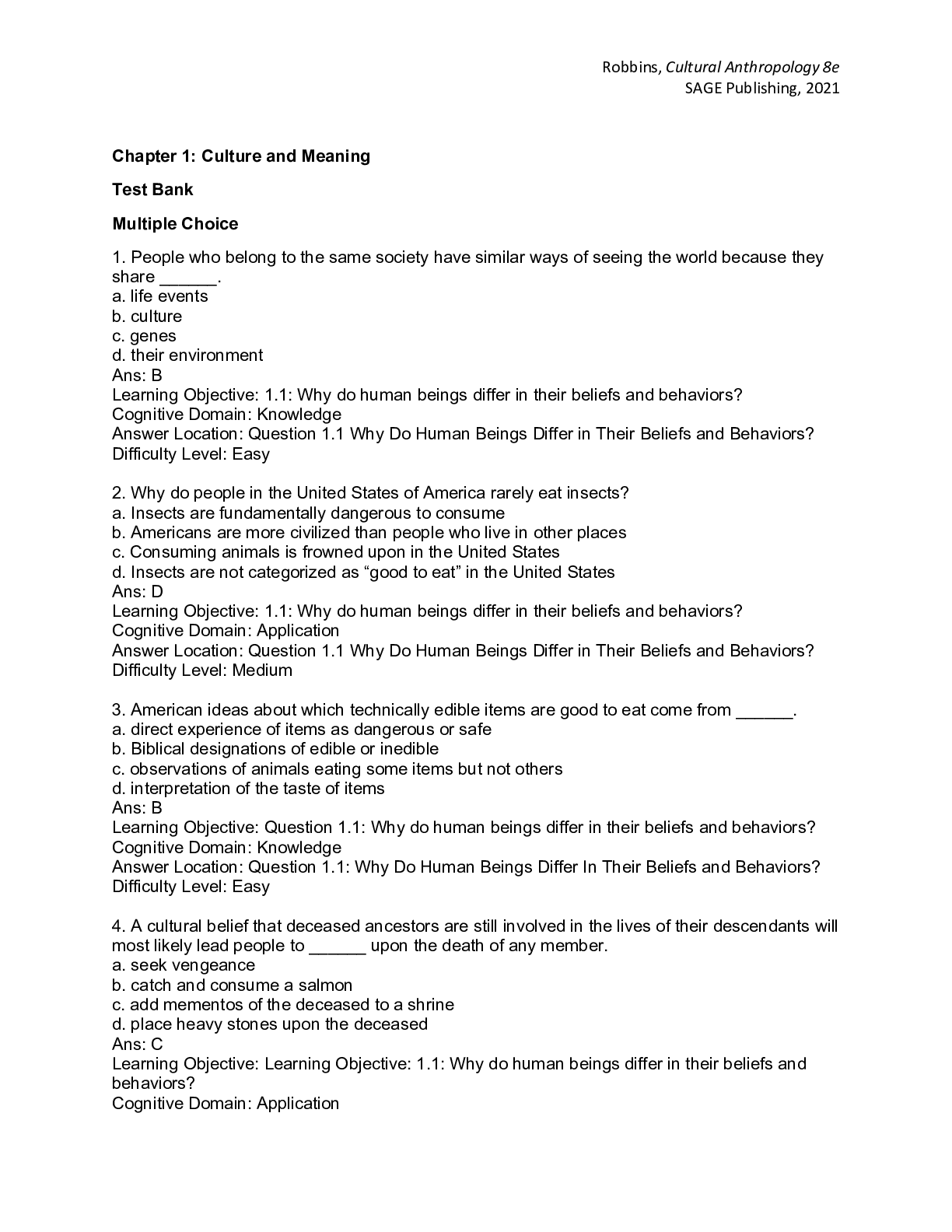
Reviews( 0 )
Document information
Connected school, study & course
About the document
Uploaded On
Aug 09, 2022
Number of pages
90
Written in
Additional information
This document has been written for:
Uploaded
Aug 09, 2022
Downloads
1
Views
310

